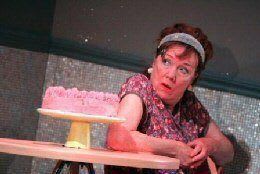The women of Enda Walsh's The New Electric Ballroom are like Chekhov's Three Sisters without a Moscow to dream of. The only worthwhile pastime in their stagnant Irish harbour town is reliving the past - which only perpetuates the cycle of stagnation.
Now, I got tired of plays about the futile repetitiveness of life when Chekhov was still writing them, eighty or ninety years before I was born. But Walsh manages somehow to present an uncompromisingly bleak worldview without making his audience want to die, and that's a praiseworthy feat.
The women (two of them, Breda and Clara, are sisters; the third, Ada, could be a daughter, younger sister or houseguest) live in an inhospitable fish-house designed by Sabina Dargeant. The aluminium door rumbles and clangs, the floor is stone with a moss-infested gutter, and even inside it's misty with cold.
They are creatures of repetition and routine. Ada encourages and directs as the old sisters endlessly play-act the loss of their innocence, years ago at the New Electric Ballroom. Through ritual repetition, the sisters worry at the perceived root of their miserable lives, and impress upon Ada the woe that awaits should she venture outside the chilly house in search of love.
In so many similarly-themed plays, the cycle of suffering rolls over the audience like a steamroller and slowly crushes out their will to live. But The New Electric Ballroom is funny, and filthy, and above all, fast-paced.
Walsh's script is so rich with glorious imagery, smut and invective that most of it has to be delivered with the speed and chatter of an express train. Colourful characters, surreal situations and casually damning comments on the personal hygiene or physical deformities of the townsfolk all zip past the window with barely a pause for breath.
Domestic discussions balance the breakneck pace of the monologues. Bookended by pregnant pauses and delivered with tremendous gravity, the most banal utterances ("May I have some tea to wash this biscuit down?") take on a ponderous portentousness.
This is not a piece of Naturalism. People do not talk this way in real life. But this is a play about stories, labels, talk; in a word, words, and Walsh's heightened, poetic writing calls attention to them.
People don't act this way, either. What little action is permitted to distract attention from the dialogue is so loaded with symbolism the women seem cowed under its weight.
The best moment comes when they finally upgrade fishmonger Patrick from regular but necessary intruder to welcome houseguest. Before he can say "milk, no sugar," he's stripped, hosed down and scrubbed pink to clean off all the labels ("lumpen, ugly, fishy") attached to him by the townsfolk.
When it comes to Ada - desperate to escape but limited in her experiences to second-hand heartbreak inherited from her companions - Walsh's direction is more ambiguous, or perhaps confusing. She's stiff, round-shouldered, often gazing or clutching ineffectually toward the middle distance.
It could be representative of her sheltered existence, but the effect often veers uncomfortably close to declamatory melodrama.
Not one of the characters will ever escape the shadow of the New Electric Ballroom; they're all doomed to repeat their greatest regrets for the rest of their lives. Meanwhile, we can all have tremendous fun laughing along and feeling unutterably glad we aren't them.
Until 29th March
